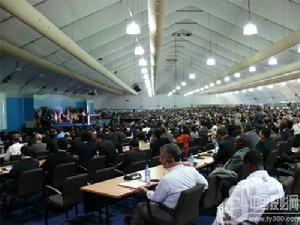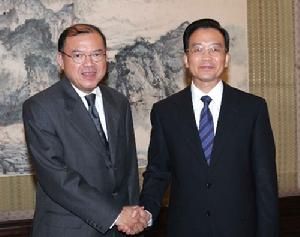UNCTAD发表评论(0)编辑词条
The United Nations Conference on Trade and Development (UNCTAD)
was established in 1964 as a permanent intergovernmental body. It is the principal organ of the United Nations General Assembly dealing with trade, investment, and development issues.
The organization's goals are to "maximize the trade, investment and development opportunities of developing countries and assist them in their efforts to integrate into the world economy on an equitable basis." (from official website). The creation of the conference was based on concerns of developing countries over the international market, multi-national corporations, and great disparity between developed nations and developing nations.
In the 1970s and 1980s, UNCTAD was closely associated with the idea of a New International Economic Order (NIEO).
Currently, UNCTAD has 193 member States and is headquartered in Geneva, Switzerland. UNCTAD has 400 staff members and an annual regular budget of approximately US$50 million and US$25 million of extrabudgetary technical assistance funds.
Meetings
The inter-governmental work is done at 5 levels of meetings:
The UNCTAD Conference – held every 4 years;
UNCTAD XIII will be held in Doha, Qatar in 2012
UNCTAD XII was held in Accra, Ghana in 21-25 April 2008
UNCTAD XI was held in São Paulo, Brazil in 13-18 June 2004
UNCTAD X was held in Bangkok, Thailand in 12-19 February 2000
UNCTAD IX was held in Midrand, South Africa in 27 April – 11 May 1996
UNCTAD VIII was held in Cartagena, Colombia in 8-25 February 1992
The UNCTAD Trade and Development Board – the Board manages the work of UNCTAD in between two Conferences and meets up to three times every year;
Four UNCTAD Commissions and one Working Party – these meet more often than the Board in order to take up policy, programme and budgetary issues;
Expert Meetings – the Commissions will convene expert meetings on selected topics in order to provide substantive and expert input for Commission policy discussions.
Panel of Eminent Persons
In October 2005, UNCTAD created the Panel of Eminent Persons "to enhance the development role and impact of UNCTAD." The panel had eight eminent persons who were "knowledgeable of development issues and with international standing in the field." It advised the UNCTAD Secretary-General and examined the best strategies for UNCTAD to meet its development mission and mandates as stated in the Bangkok Plan of Action and the São Paulo Consensus.
Eminent Persons
Fernando Henrique Cardoso (Chairman), former President of Brazil
Gro Harlem Brundtland, former Director General of the World Health Organization and former Prime Minister of Norway
Jagdish Bhagwati, Professor of Economics and Law at Columbia University
Joaquim Chissano, former President of Mozambique
Tarja Halonen, President of Finland
Yongtu Long, Secretary-General of Boao Forum for Asia, former Vice Minister of Trade and Economic Cooperation, and Chief Trade Representative of China
Benjamin Mkapa, former President of Tanzania
Lawrence Summers, former President of Harvard University, former Chief Economist of the World Bank, former Secretary of the Treasury of the United States
Manmohan Singh, Prime Minister of India
Other
UNCTAD also conducts various technical cooperation programmes such as ASYCUDA, DMFAS, EMPRETEC and WAIPA.
In addition, UNCTAD conducts certain technical cooperation in collaboration with the World Trade Organization through the joint International Trade Centre (ITC), a technical cooperation agency targeting operational and enterprise-oriented aspects of trade development.
联合国贸易和发展会议
联合国贸易和发展会议,简称贸发会议,是联合国大会常设机构之一,是审议有关国家贸易与经济发展问题的国际经济组织(以下简称贸发会议)。贸发会议每4年举行一届大会,大会是贸发会议的最高权力机构。截至2008年,贸发会议已先后在日内瓦、新德里、圣地亚哥、内罗毕、马尼拉、贝尔格莱德、日内瓦、卡塔赫纳(哥伦比亚)、米德兰(南非)、曼谷、巴西圣保罗和加纳阿克拉举行过12届大会。中国于1972年参加贸发会议,目前是贸发会议、贸发理事会以及所属各主要委员会的成员。
联合国贸易和发展会议-宗旨目标
贸发会议的宗旨是促进国际贸易,特别是加速发展中国家的经济和贸易发展,制订国际贸易和有关经济发展问题的原则和政策;推动发展中国家和发达国家在国际经济、贸易领域的重要问题谈判的进展;检查和协调联合国系统其他机构在国际贸易和经济发展方面的各项活动;采取行动以便通过多边贸易协定;协调各国政府和区域经济集团的贸易和发展战略。
贸发会议的主要目标是帮助发展中国家增强国家能力,最大限度地获取贸易和投资机会,加速发展进程,并协助它们应付全球化带来的挑战和在公平的基础上融入世界经济。贸发会议通过研究和政策分析、政府间审议、技术合作以及与非政府机构企业部门的合作实现其目标。其当前的工作领域涉及贸易、资金、技术、企业、可持续发展,以及南南合作和最不发达国家等问题。
联合国贸易和发展会议-组织机构
1992年2月在哥伦比亚卡塔赫纳市举行的联合国贸易和发展会议第八届大会同意建立一套新的组织机构。其中最高权力机构是贸发大会,由全体成员国参加,每4年举行一次。常设机构是贸易和发展理事支,每年举行一届常会和三次执行会议,理事会还下设三个委员会:货物和服务贸易及商品委员会;投资、技术和相关资金问题委员会;企业、商业便利和发展委员会。日常事务由设在日内瓦的秘书处承担,主要为贸发大会、理事会及其附属机构服务。
联合国贸易和发展会议-主要职责
该组织的任务与世界范围的商务领域有着直接的关系,因为其中心目的是给发展中国家和向市场经济过渡的前社会主义国家一些工具,使它们能成功地融入国际贸易和经济体系。这些工具包括从规范的标准制定活动,如环境会计这样的新领域,到旨在加快货物流通的实际工程;从有关投资趋向与政策的分析研究和数据收集,到推动中小型企业和企业职权。它为政府和企业提供竞争法律和政策咨询。同时,它从世界资本市场为微观金融计划创造新的渠道,加强发展中国家利用电子商务的能力。
联合国贸易和发展会议每年主要的出版物:贸易和发展报告、世界投资报告和最不发达国家报告,在它们各自领域起着权威性作用。这些报告提供最新的资料,分析全球趋势,制定政府和私营部门有用的实用政策建议。联合国贸易和发展会议的中心工作是提供地方和跨国企业得以繁荣的最佳政策框架,以此培养发展中国家固有的能力。但是能力的培养还有其它越来越重要的方面,如官员和企业行政人员在国际贸易和投资问题方面的培训。
联合国贸易和发展会议在非洲和俄罗斯主持石油工业会议;与美国企业一道推动俄罗斯科技产品;帮助发展中国家建立股票市场和商品交换市场。企业可通过下列途径直接和间接参与联合国贸易和发展会议的工作。首先,作为政府间会议的观察员或小组成员,这些会议有专家会议;联合国贸易和发展会议三个委员会(货物、服务和商品贸易委员会、投资、技术和相关金融问题委员会、企业、企业促进和发展委员会);每年一度的贸易和发展委员会;四年一次的大会。其次,各公司可与秘书处合作参与对发展有影响的、共同感兴趣的项目。
联合国贸易和发展会议-经济影响
贸发会议自成立以来,在促进发展中国家的经贸发展、推动南北对话和南南合作方面发挥了重要作用,曾主持谈判达成了一些重要的国际公约和协议,如《各国经济权力和义务宪章》、《班轮公约行动完守则》、普遍优惠制、《商品综合方案》等,在二十世界七十年代和八十年代初联合国系统内改革旧的国际经济关系和建立新的国际经济秩序和热潮中曾发挥着核心作用。近十年来,随着国际政治经济形势的急剧变化,特别是由于发达国家对发展合作态度日趋消极和由于发展中国家利益要求不同而导致的谈判能力和下降的情况下,贸发会议的谈判职能逐渐削弱,但在帮助发展中国家制订经济发展战略和贸易、投资、金融政策,加强它们参与多边经济贸易事务的能力方面,仍然发挥着独特而重要的作用,被誉为“发展中国家的良心”和“南方知识库”。如今,贸发会议仍然是倍受广大发展中国家信赖与重视的国际多边经贸组织,仍不失为牵制发达国家谋取经济私利和维护广大发展中国家正当利益的重要论坛。
website: http://www.unctad.org/
→如果您认为本词条还有待完善,请 编辑词条
词条内容仅供参考,如果您需要解决具体问题
(尤其在法律、医学等领域),建议您咨询相关领域专业人士。
0
标签: UNCTAD 联合国贸易和发展会议

同义词: 暂无同义词
关于本词条的评论 (共0条)发表评论>>










